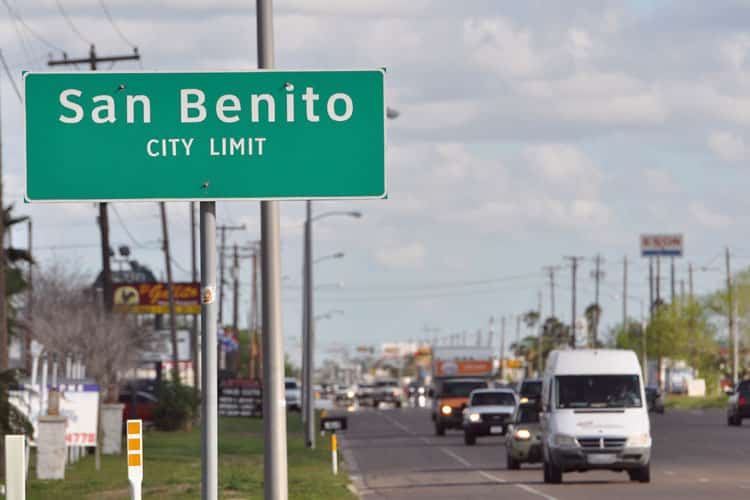SAN BENITO — After four months of debate, city commissioners on Tuesday are planning to call for a 10-percent increase in water rates spread out over a five-year period, aiming to pull the utility system out of the red while helping to pay off long-term debt tied to the new water plant.
Meanwhile, they’re proposing to raise commercial water rates by 8.3 percent to as much as 9.8 percent each year over five years, based on water usage, the city’s new water rate study shows.
In a meeting, commissioners are set to consider the city’s first water rate hike in years after previous administrations held off on taking action while the utility system’s annual deficit’s climbed to $2.8 million.
To offset annual shortfalls, officials have been dipping into the city’s general fund budget.
After years of delaying a rate hike, the utility system’s long-term debt has swelled to $19.39 million.
“It’s inevitable,” Mayor Rick Guerra said Monday. “We’d be falling short if we didn’t have the money. There’s a debt that needs to be paid.”
Guerra said the debt stems from the construction of the city’s $17.7 million water plant opened in 2009, five years before a previous administration shut it down, arguing it never properly operated.
In late 2020, city officials reopened the water plant after using a lawsuit settlement to put it back into operation.
Proposed rate increases
As part of the water rate study, consultant Jeff Snowden, with Frisco-based CAPEX Consulting Group, is recommending raising household rates by 10 percent, increasing rates 2 percent each year for five years, a plan which would boost average annual utility bills by $1.02 to as much as $1.54, based on water usage.
Meanwhile, he’s recommending officials raise commercial rates over a five-year period by 8.3 percent to as much as 9.8 percent each year, based on usage.
For businesses, the proposal would increase average annual utility bills by $12.34 to as much as $160.64, based on usage.
“The rates will be fair and equitable for residential and non-residential,” City Commissioner Rene Garcia said. “That will get us a self-sustaining utility system. That will get us back on track.”
Under the proposal, the rate hikes would cut the utility system’s debt to $5.1 million by 2028, the study shows.
Plan calls for shift in burden
As part of their proposal, commissioners are planning to shift most of the overall rate increase onto businesses while households have been paying relatively steeper amounts on some of the Rio Grande Valley’s highest water rates for years.
While businesses’ rates would climb at the start of the new fiscal year in October, the plan would hold off household increases until 2024 as the coronavirus pandemic’s production showdowns spur soaring price hikes.
“I hope people understand,” Guerra said. “We’re trying to work with people because of COVID — food costs are going up. We’re giving the people a heads up, trying to give them a chance to prepare themselves. We’re trying our best not be a burden right now. We’re trying to lessen the burden. We’re softening the burden one more year.”
COVID-19 stimulus check to offset utility losses
Meanwhile, commissioners are planning to pull $3.8 million from the city’s $9 million share of the American Rescue Plan Act to cover the utility system’s annual shortfalls until residential rate hikes kick in in 2024.
“That is a godsend,” Guerra said of the big federal stimulus check. “We’re going to use that money to get us through. We’re trying to offset some (operational) cost.”
Years without rate hike
It’s the second time Snowden’s recommended a water rate hike in about 12 years.
While Commissioner Pete Galvan believes the city’s last rate hike came in 2009, Guerra said a previous administration last boosted rates in 2014.
“The water rates should have been going up years ago but it was kicked down the road,” Guerra said. “The can was kicked all these years. It’s got to stop today.”
In 2010, a previous administration failed to carry out Snowden’s recommendation calling on officials to steadily raise rates during a five-year period through 2014, Galvan said in an earlier interview.
At the time, Snowden was recommending a rate hike that would boost customers’ utility bills by 1- to 3-percent to offset a $1.6 million shortfall in the utility department.
Background
From 2004 to 2009, the city steadily increased its water rates to help pay a $32 million debt stemming from projects including construction of the $17.7 million water plant, a $13 million sewer plant, a $1.6 million water tower and other water and sewer upgrades.
During that time, previous administrations took on the projects after decades of neglect had left the city with archaic water and sewer plants.
Now, the city’s base residential water rate stands at $20.59 for up to 2,000 gallons for homes with 5/8-inch meters while its sewer rate is $29.09 for up to 2,000 gallons.





